
Welcome to Meet The Need NC’s monthly newsletter featuring what the initiative is up to and how you can join our efforts to meet the service and supports needs of North Carolinians with intellectual or other developmental disabilities (I/DD) and their families.
This month’s topic: Further mobilizing for change – Amplifying lived experience voices
- Message from LAND, the Backbone of Meet The Need NC
- July Lunch & Learn Webinar Recap
- MTN NC Lunch & Learn Webinar Series Comes an End
- LENS: Lived Experience Network Speaks
- Meet The Need Initiative Update
- New Episode of The Waiting Room Podcast!
- Let’s get social! Stay in touch with us on Facebook, Instagram and more!
Message from LAND, the Backbone of Meet The Need NC
Get ready for our next groundswell for change: mobilizing, joining and amplifying our statewide, community-based voices for system change. Individuals and families living with intellectual or other developmental disabilities (I/DD) will be at the heart of this effort.
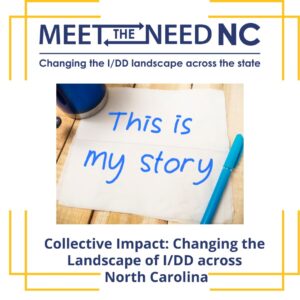 As a collective impact grassroots movement to meet the service and support needs of our I/DD Community in North Carolina, we brought together multiple stakeholder groups into a learning community during the last three years. This newsletter, which provides information to extend the learning of our monthly disability webinar series, has highlighted key issues for this learning community.
As a collective impact grassroots movement to meet the service and support needs of our I/DD Community in North Carolina, we brought together multiple stakeholder groups into a learning community during the last three years. This newsletter, which provides information to extend the learning of our monthly disability webinar series, has highlighted key issues for this learning community.
Raising up the voices of those with lived experience is at the heart of LAND (Leadership Alliance for Neurodevelopmental Disabilities), the backbone organization of Meet The Need NC (MTN). We are an I/DD advocacy group which is part of a family-run 501(c)(3) non-profit that focuses on bringing change from the perspective of lived experience.
It is important to recognize that as we shift to elevate and more intentionally include the voices of people with lived experience in our MTN advocacy movement, we will not forget or stop joining together with the entire I/DD Community to move forward to make change. For our next programming phase, we will draw in the voices with lived experience at the community-based local level and other communities to kick-off the grassroots advocacy phase of our movement. This is an extension of what we started when the MTN initiative first began.
Grassroots advocacy is the process of building and organizing public support to achieve policy goals. In the case of MTN, it is working to inform and educate local stakeholder groups across the state about the need to reduce or eliminate the Innovations Waiver Waitlist by adding more Waiver slots and growing the capacity of our direct support professional workforce that is key to helping people with I/DD to live at home and in their communities. We will educate about issues related to creating a pathway to community-based living and provide further advocacy training for telling one’s story to impact change.
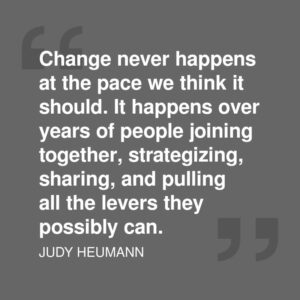 Why are we making this shift? As we look at other large-scale I/DD policy changes, such as with the American Disabilities Act (ADA) and the Olmstead Decision, we see that change started with local, community-based people who were impacted by issues. Change started with people who sat around kitchen tables sharing stories and talking about how their needs were not being met, and identifying a shared need to forge change. Such was the case of the forming of LAND and the NC Waiver Action Team, who were featured during this month’s webinar.
Why are we making this shift? As we look at other large-scale I/DD policy changes, such as with the American Disabilities Act (ADA) and the Olmstead Decision, we see that change started with local, community-based people who were impacted by issues. Change started with people who sat around kitchen tables sharing stories and talking about how their needs were not being met, and identifying a shared need to forge change. Such was the case of the forming of LAND and the NC Waiver Action Team, who were featured during this month’s webinar.
Grassroots movements are empowering for those involved in their efforts, and typically driven by a sense of urgency. They require the joining together of many stakeholder groups for change.
Elizabeth Field, M.S., Co-Founder, LAND; Program Director, MTN
Meet The Need NC is an initiative to change the intellectual and other developmental disabilities (I/DD) landscape across the state and is funded by the North Carolina Council on Developmental Disabilities. Meet The Need NC is driven by the Leadership Alliance for Neurodevelopmental Disabilities (LAND), a program of the 501c3 nonprofit, Mental Health Transformation Alliance (MHTA). Learn more about LAND at https://mentalhealthtransformationalli.godaddysites.com/land.
July Lunch & Learn Webinar Recap
Learnings for Grassroots Advocacy: From the Americans with Disabilities Act to the Olmstead Decision
Our July webinar took a deep dive into grassroots advocacy and how importance throughout the history of advocating for the rights of people with disabilities. Beth Field, program director for the Leadership Alliance for Neurodevelopmental Disabilities, an advocacy group of the Mental Health Transformation Alliance and Meet The Need NC, opened by thanking attendees for their commitment to equal voice, respect for all people and all opinions, and community collaboration for systemic change. She shared that during the next year, the Meet The Need NC program will be shifting its focus to mobilizing grassroots advocates to reduce the innovations waiver waitlist and increase the pool of direct support professionals (DSPs) in North Carolina.

Beth opened the floor for attendees to share what the terms grassroots and advocacy meant to them. Cheryl Powell, LENS Advisory Group Chair and self-advocate, defined grassroots as starting with one person’s idea and growing from there, while others shared that advocacy means using your voice to stand up for yourself or others.
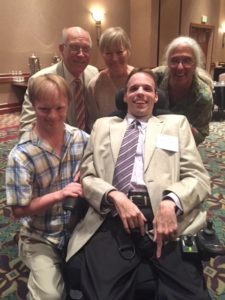
John Nash, executive director of The Arc of North Carolina, spoke about policy changes that began with “kitchen table” discussions, emphasizing the power of community collaboration. He noted that the challenge of grassroots organizing is focusing a range of voices in a single direction that moves things forward. Nash outlined specific strategies for effective change-making and relationship-building. He cited the Americans with Disabilities Act, where Democrat Senator Ted Kenny and Republican Senator Orin Hatch set aside their differences to achieve significant progress in disability rights.
Cheryl introduced The Waiver Action Team, an information and advocacy group made up of parent advocates, Bill Donohue, Deborah Woolard, and Sarah Potter, and self-advocate, Matt Potter. Their goal is to achieve equality in community-based funding for people with intellectual or other developmental disabilities (I/DD). Despite challenges during the COVID-19 pandemic to push their word forward, their future focus is helping individuals find belonging and suitable career options. More information is available on their website.
Beth concluded the webinar by saying, “We are changing the landscape together, changing it with possibility and with hope.”
Watch the Webinar!
Links to more resources from the webinar:
- Presenter slides from John Nash, Executive Director, The Arc of NC
- Watch a pre-recorded interview with the NC Waiver Action Team
- Listen to our latest The Waiting Room podcast where host Kenneth Kelty shares more conversations about grassroots advocacy from this month’s webinar guests.
About the speaker: John Nash is the current Executive Director at The Arc of North Carolina. He has previous experience as an Executive Director at PSW, a Grant Writer & Consultant at Valley Research & Management, and as the CEO at Tule River Economic Development Corp. John has a MA in Leadership, Organizational Management, and Conflict Resolution from Fresno Pacific University as well as a BA in Political Science, International Relations, and Japanese from Brigham Young University.
MTN NC Lunch & Learn Webinar Series Comes an End
If you previously registered for the August webinar, please note that it has been cancelled.
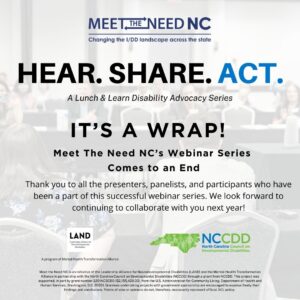 After 17 webinars and 16 newsletters, the July 2024 webinar marked the end of the Meet The Need NC (MTN) Hear. Share. Act. Lunch & Learn webinar series and the monthly follow-up newsletter. One last webinar was to be held in August, but was cancelled as MTN NC shifts its focus and planning for the next year to include educating, mobilizing and uniting community-based, grassroots voices through education and training. Read more about this pivot in our Meet The Need Initiative Update article in this newsletter.
After 17 webinars and 16 newsletters, the July 2024 webinar marked the end of the Meet The Need NC (MTN) Hear. Share. Act. Lunch & Learn webinar series and the monthly follow-up newsletter. One last webinar was to be held in August, but was cancelled as MTN NC shifts its focus and planning for the next year to include educating, mobilizing and uniting community-based, grassroots voices through education and training. Read more about this pivot in our Meet The Need Initiative Update article in this newsletter.
The Hear. Share. Act. initiative began three years ago as a story gathering and advocacy event for people with I/DD and their families. The inaugural, hybrid events were held in Boone and Greenville, North Carolina and welcomed local families, individuals with I/DD, agency leaders, and policy and decision makers.
After the story gathering campaign, a monthly Hear. Share. Act. Lunch & Learn Webinar Series was launched in January 2023 to address topics that are important to the I/DD community. Follow-up newsletters focusing on the webinar topics also began at that time. You can still access our webinar recordings and past newsletters on our website.
Meet The Need NC and LAND would like to thank all the presenters, panelists, and participants who have been a part of this successful webinar series. We look forward to continuing to collaborate with you next year!
LENS: Lived Experience Network Speaks
 LENS, which stands for Lived Experience Network Speaks, is a blog provided by Meet The Need NC from our LENS Advisory Group. LENS includes individuals with intellectual and/or developmental disabilities (I/DD) experience, including people with I/DD, families, and caregivers with separate groups for those who speak English or Spanish.
LENS, which stands for Lived Experience Network Speaks, is a blog provided by Meet The Need NC from our LENS Advisory Group. LENS includes individuals with intellectual and/or developmental disabilities (I/DD) experience, including people with I/DD, families, and caregivers with separate groups for those who speak English or Spanish.
We provide a space for them to share freely, but these opinions do not necessarily represent those of Meet The Need NC or all members of the LENS Advisory Group.
The ADA and the Olmstead Decision: Advocacy Continues to Advance Disability Rights in North Carolina

In 1990, the Americans with Disabilities Act (ADA) was signed into law, marking a significant milestone in the advancement of disability rights and accessibility across the United States. The ADA aimed to ensure equal opportunities, protection against discrimination, and full participation in society for individuals with disabilities. Fast forward to 1999, the landmark Supreme Court decision in Olmstead v. L.C. solidified the rights of individuals with disabilities to receive services in the community rather than in institutional settings.
The Olmstead Decision has been a landmark ruling in the fight for disability rights, its true impact still being determined. This Supreme Court decision, which affirmed that unnecessary institutionalization of people with disabilities is a form of unlawful discrimination, has empowered self-advocates and family advocates alike to challenge the status quo.
In North Carolina, the impact of the ADA and the Olmstead decision has been profound, reshaping the landscape of disability rights, services, and inclusion in the state. The ADA paved the way for accessible infrastructure, accommodations, and employment opportunities for individuals with disabilities, fostering a more inclusive and equitable society. The Olmstead decision further reinforced the principle of community integration, emphasizing the right of individuals with disabilities to live and receive services in the least restrictive environment. The Olmstead Decision has become a rallying cry for those demanding greater community-based services and independent living options.
Since the ADA and Olmstead decision, North Carolina has made significant strides in promoting independence, autonomy, and choice for individuals with disabilities. Self-advocates continue to raise their voices, insisting on the right to live, work and thrive in their communities. Family members advocate tirelessly for their loved ones, fighting against outdated institutional models. Together, they are shaping the future and ensuring the Olmstead Decision remains a living, evolving protection for the disability community. The state has prioritized community-based services, housing options, employment supports, and healthcare access to ensure that individuals with disabilities can lead fulfilling and meaningful lives in their communities.
North Carolina’s commitment to ADA compliance and Olmstead implementation has been reflected in initiatives such as the North Carolina Department of Health and Human Services’ Olmstead Plan, which outlines strategies to expand community services, enhance employment opportunities, and improve accessibility for individuals with disabilities. The state has also invested in programs and resources to support individuals transitioning from institutional settings to community living, promoting self-determination and empowerment. While progress has been made, there is still much work to be done to fully realize the promise of this critical ruling.
The fight is far from over, but the Olmstead Decision has provided a powerful legal foundation upon which to build a more inclusive, equitable society. With unwavering determination, advocates are proving that this landmark case is not merely decided, but continuously deciding the course of disability rights. As North Carolina continues to progress in disability rights and inclusion, the legacy of the ADA and Olmstead decision serves as a guiding light, reminding us of the importance of upholding the rights and dignity of individuals with disabilities. By advocating for accessibility, community integration, and equal opportunities, Self advocates and family advocates can help North Carolina to pave the way for a more inclusive and equitable future for all its residents, regardless of ability.
Co-chair Lived Experience Network Speaks (LENS); Member of Leadership Alliance for Neurodevelopmental Disabilities (LAND), a program of Mental Health Transformation Alliance; Project Member of Meet The Need NC
Meet The Need NC Initiative Update
We spent the last year gathering information from our North Carolina I/DD Community to inform our 2024-2025 MTN Work Plan. Thank you for your input! This included our Policy Think Tank last fall and follow up webinars held in the spring, along with the LENS advisor group, and MTN Advisory Collaborative meetings. From these discussions, we have agreed on a goal and strategies for our 2024-2025 MTN Work Plan.
We have formed a MTN Work Plan Task Force that will meet monthly through the next long session crossover, through May 2025. Our LENS advisory group will continue to meet monthly as it works to educate, mobilize and unite community-based, grassroots voices through education and training. Our MTN Advisory Collaborative that has met for the past three years will continue to meet quarterly to oversee and counsel MTN programming.
2024-2025 MTN Work Plan
Our Goal:
By the adjournment of the 2025 NCGA long session, Meet the Need NC will educate members of the NCGA to reduce and/or eliminate the Innovations Waitlist while supporting the growth of a pool of Direct Support Professionals (DSP) to help ensure community living choices for those with I/DD.
Proposed Strategies:
- Drive Grassroots, Community Engagement: Continue targeted relationship-building and advocacy efforts among NC elected officials and those with lived experience with a set of consistent messages at the community level.
- Educate target stakeholders, including the general public, on the Innovations Waiver and access to available services and supports while waiting.
- Advocate for dashboards and other data sources with data relevant for consumers and elected officials.
- Unify and amplify DSP messaging for state legislators and the general public.
Other Updates for the I/DD Community
- “NC Medicaid is rolling out ‘tailored’ plans for complex beneficiaries. Your questions answered” (Article from NC Health News) https://www.northcarolinahealthnews.org/2024/06/18/tailored-medicaid-plans-faq/
- Toolkit: Transitions to Tailored Plans (NCDHHS)
https://medicaid.ncdhhs.gov/tailored-plans/toolkit - 1915(i) Medicaid Home and Community-Based Services brochure (NCDHHS)
https://medicaid.ncdhhs.gov/flyer-1915i-medicaid-home-and-community-based-services/open - Innovations Waiver (NCDHHS)
https://medicaid.ncdhhs.gov/providers/programs-and-services/behavioral-health-idd/nc-innovations-waiver - North Carolina State Consumer and Family Advisory Committee: Nothing About Us, Without Us (Annual Report for Fiscal Year 2023-2024)
https://www.ncdhhs.gov/scfac-final-approved-annual-report/open
New Episode of The Waiting Room Podcast!
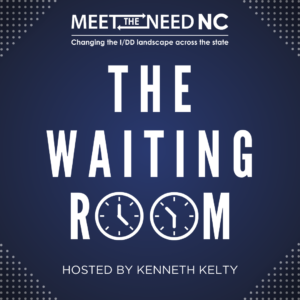 Listen to the latest episode of Meet the Need NC’s podcast, The Waiting Room! This episode, Learnings for Grassroots Advocacy: From the ADA to the Olmstead Decision, is a conversation that focuses on the history, meaning, and importance of grassroots advocacy for people with intellectual or other developmental disabilities (I/DD).
Listen to the latest episode of Meet the Need NC’s podcast, The Waiting Room! This episode, Learnings for Grassroots Advocacy: From the ADA to the Olmstead Decision, is a conversation that focuses on the history, meaning, and importance of grassroots advocacy for people with intellectual or other developmental disabilities (I/DD).
Host Kenneth Kelty welcomes John Nash, executive director of The Arc of North Carolina, who talks about policy changes that began with “kitchen table” discussions, emphasizing the power of community collaboration, and the challenge of grassroots organizing to focus on a range of voices in a single forward-moving direction. Members of the North Carolina Waiver Action Team, which includes Bill Donahue, Deb Woolard, Sarah Potter, and Matt Potter, share their insights and lived experiences with grassroots advocacy in North Carolina.
The Waiting Room is a podcast that shines a light on the ever-growing Medicaid Innovations Waiver waitlist, the Direct Support Professional (DSP) crisis, and other unmet needs of people with I/DD who live in North Carolina. Join us as we focus on these issues to educate, inform and build a community along the way with award winning motivational speaker, activist, and your host, Kenneth Kelty.
Let’s get social!
Want to stay informed about issues that are important to you and your community? Follow us and subscribe to our email alerts! Here’s where to find us:
- Follow us on social media on Facebook and Instagram.
- View our Lunch & Learn webinar recordings and other video clips on our YouTube channel.
- Listen to our podcast, The Waiting Room, hosted by Kenneth Kelty.
- Visit our website for updates, resources and links to other helpful websites.
- Join our email list to receive notifications and announcements.
Most importantly … share this information! Encourage others to subscribe to our e-mail list and follow us on social media so they, too, can be part of Meet The Need’s vision and mission to change the I/DD landscape across North Carolina through a common agenda. Together, we can make it happen!
